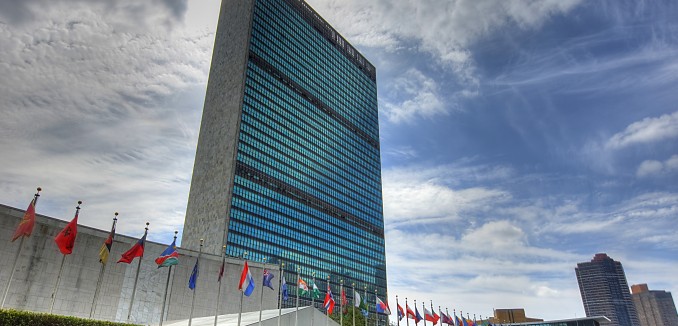A United Nations office has coordinated the donation of millions of dollars to NGOs that are highly critical of Israel, and has helped those groups disseminate their information, a new report by the watchdog group NGO Monitor has documented.
The UN Office for the Coordination of Humanitarian Affairs (OCHA) is responsible for “bringing together humanitarian actors to ensure a coherent response to emergencies,” as it describes on its website. In practice, its office that focuses on the Israeli-Palestinian conflict (OCHA-oPt) has helped convene and fund numerous NGOs that almost uniformly are critical of Israel.
This year, OCHA-oPt requested $571 million from international donors to support controversial NGOs, including Islamic Relief Worldwide, which was outlawed by Israel in June 2014 for its alleged role in funneling money to the terrorist organization Hamas; multiple organizations like Norwegian Peoples Aid and the Ma’an Development Center that support and mobilize anti-Israel BDS (boycott, divestment, and sanctions) campaigns; and the Palestinian Center for Human Rights, a leader of anti-Israel “lawfare” campaigns. The UN organization’s 2016 Humanitarian Response Plan alleges that “the primary responsibility [for the conflict] lies with the occupying power”—Israel. To solve this, OCHA wrote, its partners “will prioritize victims seeking accountability for [international law] violations.” But Israeli victims of Palestinian violence will not have access to these services, the report noted.
OCHA-oPt publishes scheduled reports, fact sheets, and other publications that “promote a narrative based solely on Palestinian victimization and Israeli aggression, while minimizing Palestinian terror, rejectionism, incitement, and legitimate Israeli national security concerns,” NGO Monitor wrote. For example, a February report documented the number of Palestinians killed by Israeli forces, but did not specify how many of them were killed while attempting to attack Israeli civilians, soldiers, or police officers, as has happened repeatedly since the current wave of violence began in September. Much of OCHA-oPt’s reports contain data and information from pro-Palestinian NGOs, the PLO, and even Hamas, and yet almost never cite statistics from Israeli sources like the Israel Defense Forces or the Israeli Ministry of Foreign Affairs, the NGO Monitor report alleged.
OCHA also organizes “Thematic Clusters,” which convene UN agencies, government donors, and NGOs to collaborate on activities. During Operation Protective Edge in 2014, OCHA’s “Protection Cluster” designated groups like B’Tselem and the Palestinian Center for Human Rights to provide casualty statistics that were subsequently cited in UN reports, the media, and by government officials. These groups appeared to have been repeating information originating with Hamas officials in Gaza, NGO Monitor wrote.
OCHA’s politicization extends beyond Israel. Its 2016 humanitarian response plan for Syria was changed after OCHA “altered dozens of passages and omitted pertinent information to paint the government of Bashar al-Assad in a more favorable light,” Foreign Policy reported.
OCHA-oPt’s budget, which in 2013 was nearly five million dollars, is largely provided by the European Union and constituent states like Belgium, Spain, Norway, and Sweden.
NGO Monitor’s full report can be seen here.
[Photos: knowsphotos / flickr]




